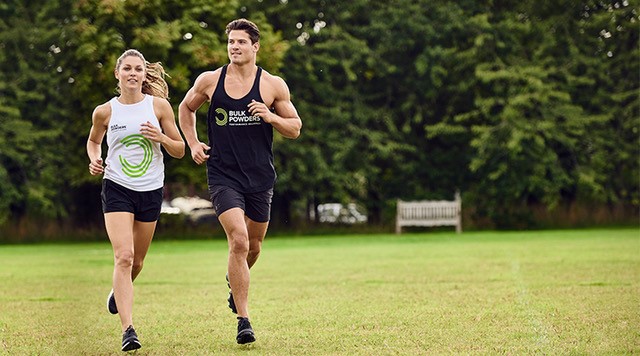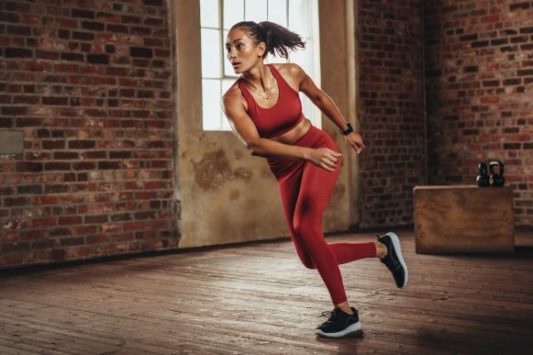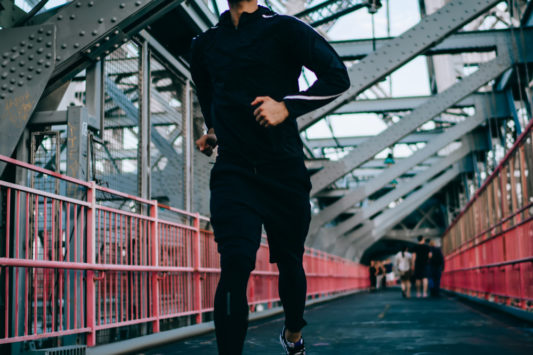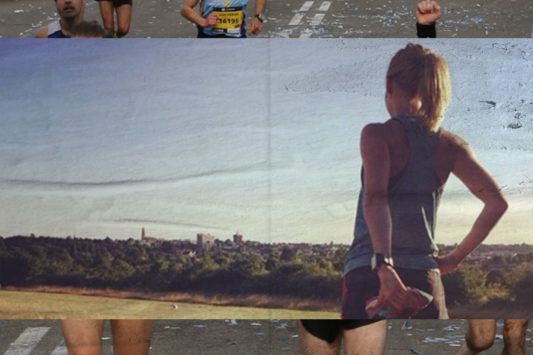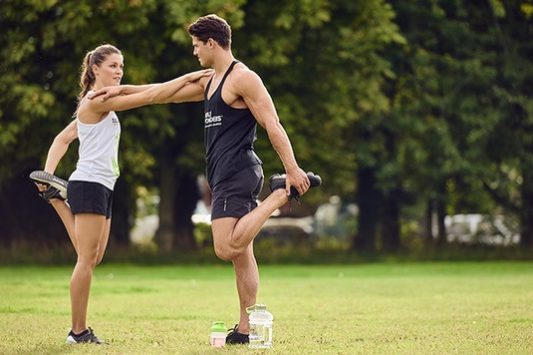Sports nutrition advice for endurance events – before and during
There are two important things you’ve got to know about when heading into an event and the reason they are important is because one of them is going to get you… it’s just which arrives first! So, these are:
- muscle glycogen depletion
- hypoglycaemia
In endurance events lasting longer than 90 minutes, you’ll be wanting to maximise both your endurance capacity and performance no doubt, and I think this applies to both triathlons & marathons. Basically, you want your best times without crawling your way across the finish line!
Luckily, I’m here to give you some nutritional strategies to enable you to be the best, so here’s what you need to know.
1. You’re going to need to carb load
The evidence strongly supports that filling up those muscles with plenty of carbs (glycogen stores) will improve your performance. However, to do this correctly, you will need to accept a few things you might not like if you’re quite health conscious…
- First up, you will gain water weight (temporarily), this could be up to 2kg (could be, not will be!), but you need to remember this is good as you will know your muscles are fuelling up very well!
- Secondly, your carbs will probably be a good 75% of your total daily calories – if you’re doing it right! This seems excessive, but it’s just a few days and purely for performance benefits.
- Also, you will probably need to swap for some less nutritious sources of carbs – sticking with fibrous sources of carbs will make you feel fuller & its highly likely you won’t be eating enough carbs as what you need. So, in this case we need to make little swaps like brown rice/pasta for white, snacking on jam on white toast and probably jelly babies and sports drinks too… again these are just temporary measures!
Carb loading for 3-4 days is a great strategy to get you fuelled up & ready for the big day! Eat between 8-10g/kg body weight in carbs, so in my case at 63kg, I’d need 504-630g of daily carbs over the 3-4 days.
As well as increasing your carbs, you should probably consider tapering your training in the same 3-4 days. If you train at the same intensity, you can cause muscle damage close to competition and this can reduce your ability to resynthesise your carb stores (a bit risky basically)… so try and tone down the training/rest!
2. The night before the competition
This is a golden opportunity to really push up those carb stores and it is actually a really important meal to know about! Your dinner plate needs to be rich in carbs that are easy to digest and a type of meal you’ve eaten regularly in your training (e.g. don’t make this a night to try a Vindaloo curry for the first time).
Make this meal pretty low in fibre content too, don’t fuss much about vegetables but make sure to get in high-quality protein; poultry/white fish/lean beef/seafood. Keep the fat content pretty low in this evening meal too.
Try cooking something like chicken skewers with a big portion of flavoured white rice or a turkey bolognese with a big heap of white spaghetti!
3. The morning of your event: find out what works for you
The big day! Your stomach could be churning with nerves or you could be as cool as a cucumber so your nutrition here needs to be individual.
A low fibre, high carb breakfast around 3-4 hours prior to starting is a good strategy. Provided you’ve carb loaded properly, had a decent evening meal the night before, your carbs on the morning could be high GI (like a good few slices of jam on white toast or a big bowl of cornflakes), or low GI (like porridge and honey, made with low-fat milk). Keep it low in fat and low-ish in protein too and eat between 200 – 300g of carbs in this morning meal.
Research does suggest some benefits for a low GI option, with signs of an improved exercise capacity (how long you can go for). If you’re into marathons, this might be a good route, however, if you’re a triathlete aiming for your fastest time, it may not be as applicable.
Generally, use your training to find out what carb breakfast works for you. Trial high and low GI meals, trial carb drinks and snacks also if you think you’ll be too nervous to eat the morning of too. Which energises you the best is the way to go!
4. The hour before your event
1 hour before, you might want to think about taking on some more food. However, this doesn’t suit everyone. Some research shows ‘rebound hypoglycaemia’ with high carb food 1 hour before, but this is by no means seen in all. Energy gels, cereal bars or fruit like bananas are an example of a good type of snack in this instance and you should definitely trial this in your training to see if it offers you any benefit.
Triathletes! – your first leg is likely to be swimming which means no access to food or snacks till you’re on the bike. So, you might want to take on that extra bit of carbs in this hour period.
Marathon runners – again, trial it and see if 1-hour pre-exercise carbs work for you. If not, there are more opportunities for you to snack/drink from the outset, so it’s not as big of an issue.
This brings me nicely onto the last part of this article…
Eating during your event
The considerations here are; knowing how many carbs to take on and what type of carbs because we need to combat the muscle glycogen depletion and hypoglycaemia that I mentioned earlier.
Take on board 30-60g of carbs per hour after the first 60-minutes of your event, and aim to feed on these carb products every 15-20 minutes. Glucose, sucrose, maltose and maltodextrin-based products enable carbs to be delivered and absorbed fast by the body. So, sourcing out high carb snacks, bars, gels or drinks are ideal. Examples like; Complete Energy Gels™ or jelly babies would be good options to consider.
It’s important to know however that glucose can only be absorbed at a rate of 1g per minute by the body. By this I mean that shovelling down tonnes of sport gels/bars containing glucose and exceeding this 60g/hour figure is going to give you nothing more than a bad belly… more is not always better!
Saying this, there are ways to increase the absorption of carbs into the body, which those of who do long-endurance events might be interested it. This is done by using products that contain a glucose and fructose mix. This basically means we are able to pump even more carbs into our bloodstream (than what glucose alone can offer), proving fuel for the muscles and glucose to maintain a stable blood sugar.
Carb-electrolyte drinks are commonly consumed in endurance events and are also very effective to enhance performance. This brings me onto the importance of hydration in sports which I will be covering in its own separate article (because it’s that important!) – so watch out for that soon.
A final note…
I’ve tried to give an overview of some of the most important nutrition strategies you need to consider when doing your endurance events, but I’ll just round off with a nice quick summary;
- Carb-loading must become an endurance athlete’s best friend.
- Adjust training schedules during the carb-load to maximise its effect.
- Scrap the vegetables the night before, have plenty of carbs and probably pass on a spicy curry…
- Practice what breakfast you’ll eat before you compete, find what’s comfortable & energising.
- If eating carbs 60 minutes before enhances your performance – do it, if not, don’t force yourself.
- Source out snacks/drinks that work for you when competing. Stick to the advised amount to prevent any stomach upset too!
And finally…best of luck in your 2019 endurance training & events!
About the Author
Lydia Reece has a BSc in Food & Nutrition, a Masters in Human Nutrition and is a UK accredited Associate Nutritionist. She also has her own nutrition consultancy business – flonutrition. Lydia has published articles and blogs in the UK, Europe and as far as Australia covering topics on diet, health and sports nutrition. She’s also very much into her sports and exercise and regularly weight trains, swims, watches and plays football.
